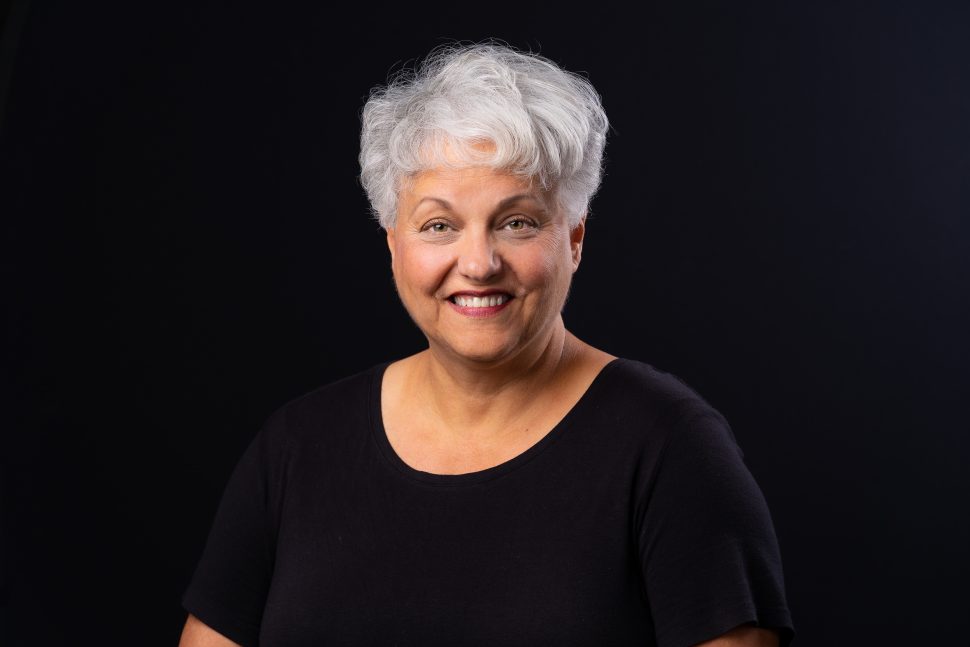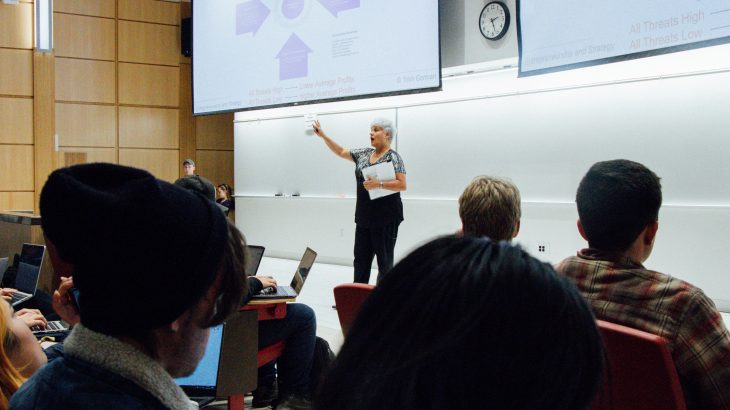Kathy Hajeb is a director at the top-10 ranked Lassonde Entrepreneur Institute and associate professor for the Department of Entrepreneurship & Strategy at the David Eccles School of Business. She is one of the minds behind the nationally acclaimed Lassonde Studios facility and the new Lassonde+X program, which allows university students to link any major to entrepreneurship.
After over 20 years working in the natural resources industry, Hajeb returned to her alma mater in 2003 to lead new projects and teach students to ask why, stay positive, and seek out problems that need solving.
How did you arrive at the University of Utah? What brought you here?
Hajeb: I got my undergraduate and master’s degrees from the U. Then I went to work at a good job, with a good company, and ended up staying there for almost 23 years. It took me that long to figure out that the work I was doing wasn’t as interesting, challenging, or people focused as I desired. I wanted to work with people who saw potential to improve the world and challenge ways of doing things.
I wanted to do more reflective work inside an organization that was more aligned with things I cared about. The University of Utah is in the business of self-improvement, which I loved, and it just drew me right back in. I have the absolute coolest job — it’s the most entrepreneurial out there. I get to create new programs, work with young students, and fix different problems every day.
What’s the purpose of entrepreneurship?
Hajeb: To me, entrepreneurship is synonymous with value creation and problem solving. These students are trying to find a way to improve the world and make their own lives better.
What has been your favorite course to teach?
Hajeb: About three years ago, then-President Watkins, Dean Randall, Pierre Lassonde and other key university leaders looked for a way to bring entrepreneurship to all student majors on campus. Lassonde+X was created.
What makes Lassonde and its programming unique is the interdisciplinary nature of the work, and we wanted to make that more obvious to every student, in every major. Lassonde+X gives art, humanities, engineering, and yes, even business students the opportunity to see their major, and their careers, through an entrepreneurial lens. I teach both the Value, Impact, Business & Entrepreneurship (VIBE) course as part of the core business curriculum and the Lassonde+X portfolio course and it’s been very fulfilling. I get to teach students to think about the world from a “see a problem, solve a problem” viewpoint, and then recap their work in a digital website portfolio. Creating value is so much more than just a “cool idea.” How can you propose ideas or solutions if you don’t understand a demand in the market or problem needing to be solved?

Kathy Hajeb, a director at the Lassonde Entrepreneur Institute and associate professor for the Department of Entrepreneurship & Strategy
Is there an opportunity for entrepreneurs and entrepreneurial students? If so, how can it be achieved?
Hajeb: There’s a foundational question that every student should be able to answer: Why did you come to college? And, even deeper than that, why did you choose your major? Your program? What are you doing here? When I ask students these questions, it’s hard to get a good answer from them — they’re not used to being asked the question! I think that’s one of the ways that our education system historically under-serves students: we need to ask ourselves why more often, why we’re making decisions, why we care about things. If we did, we could identify our interests so much earlier and spend time aligning what we are learning in classes with cultivating skills and talents. I know that would have helped me — I just wanted to get things done, get a job. Then I got to midlife and realized what I was doing had no relation to my value system and thought “I wish I would have known that earlier.”
Identifying your “why” would really help students find alignment with their academic choices and make their learning more enjoyable.
It’s often said that when it comes to entrepreneurship, practical experience is best. What’s the advantage of an academic background in entrepreneurship?
Hajeb: It’s amazing what students will do for an assignment or for school credit that they’d never do otherwise. Outside of the classroom, of course you can go start a business, you can work on a project, but how many people really do that, of their own accord, with no support? I think what entrepreneurship education does is give those people, our students, a framework of skills. Not only that, but the multiple cycles to practice and cultivate those skills.
Entrepreneurship academics also give students in other studies space in their academic careers to find their why, ask those all-important questions, and connect the dots among what they’re learning in class and what’s happening in the real world.
What skills do you want students leaving your classes or conversations with?
Hajeb: By far, being able to systematically see the big picture. We don’t pause to be very good listeners and observers, and we need to do more of that, without coming up with our own conclusion and then biasing everything to fit that story. We need to challenge existing norms, but kindly.
If my students can challenge norms — in education, healthcare, in all of it — while being gracious and humble, that’s magic. That’s the secret sauce, and it’s something you’re confronted with all the time in my entrepreneurship classes. How do you challenge things and innovate new ideas while building partnerships and alliances?
What does success look like for entrepreneurs? Is it quantitative or what?
Hajeb: There needs to be a good alignment between the work you love to do and the work the world needs you to do. That’s something I wish I had known when I was getting my undergrad, but I know it now, and it’s changed my career, and my view of success.
I’m not a believer in encouraging entrepreneurial students to do whatever it takes to make the six, seven figure salaries if they hate what they do. To me, that’s not success. You need to find that sweet spot, where you’re excited to get up in the morning, so motivated to find the puzzle and put together the pieces, to make progress. And, those problems need to be big ones, ones that many people would benefit from you finding the answers. It’s finding that match of motivations, of need, that is success to me. I truly believe if you are working to solve problems for others, you will find financial success if that endeavor.



